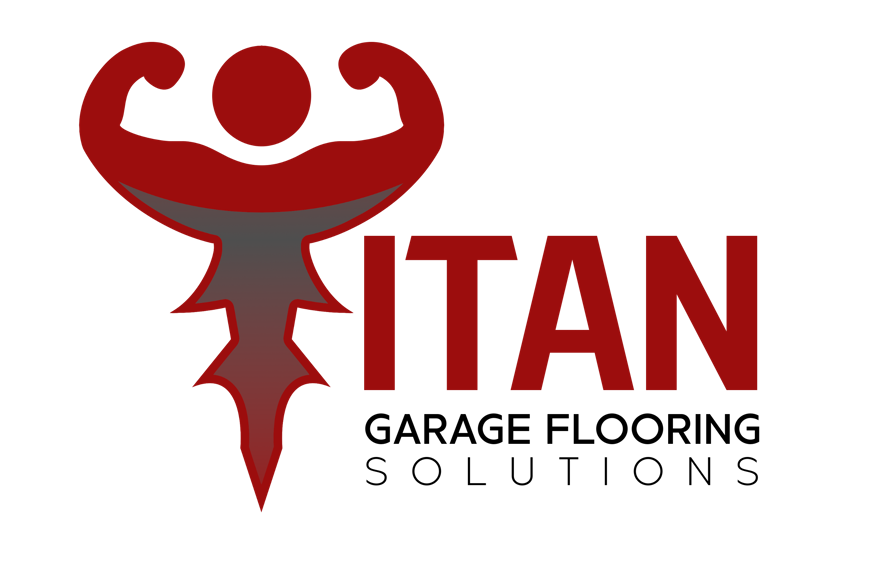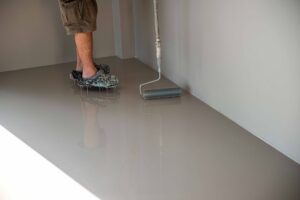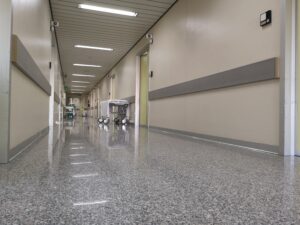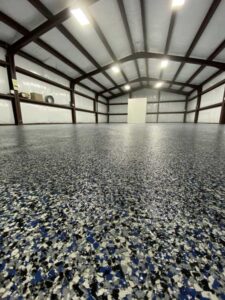If you are looking to finish a concrete floor in Nashville, you may run into the dilemma of which finish to choose. There are a lot of different options to choose from, but depending on your situation some finishes may be better than others. The amount of durability you need depends on weather and foot/vehicle traffic. Some of the two most popular finishes for concrete floors in Nashville are epoxy and polyurea.
Epoxy Floors
Epoxy floors are made out of resin and a hardening chemical mixed. It’s then carefully put on the concrete, ensuring no air bubbles form during curing. It has a customizable appearance—you can make it any color you wish.
Consumers lean towards epoxy floors in Nashville due to the low cost. It’s a popular Nashville flooring option for schools, hospitals, and industrial spaces. The epoxy is liquid and stain resistant so it allows easy cleanup for any spills. Depending on the epoxy and its contents it can take up to a few days to be fully cured. This is fine for people that have the time to wait, but if you find you need to repair it later on it could become a hassle.
While the epoxy flooring option is generally cheaper when it comes to materials and installation, you are getting what you pay for. Epoxy isn’t as durable as other materials and may require frequent repairs or refinishing. If it is exposed to UV light, it can yellow and degrade over time. Other materials used in epoxy break down over time, and you’ll find your floors chipping or cracking after just a few years. Epoxy floors aren’t as pliable when you live in a weather fluctuating area like Nashville, Tennessee.
Epoxy also needs to be used on certain concretes like CSP1 and CSP2 or it may not hold. There are certain cleaners that you can’t use on epoxy floors (like bleach) because they will eat away at the epoxy and cause it to dissolve. Citric cleaners, vinegar, and soaps should also be avoided. Citric acid and vinegar will eat away at your epoxy. Soap will clean the floors, but it will also leave behind a residue that dulls the floors.
The biggest downside of epoxy floors is that they release volatile organic compounds (VOC) into the air. The epoxy will make the room smell horrible while it’s being cured. VOCs can be terrible for the environment and your health.
Polyurea Floors
Polyurea floors are a form of polyurethane floors that are more durable and resistant to UV rays than epoxy and polyurethane. Polyurea floors are better for climates with fluctuating temperatures, as they’re more flexible and can shift with the concrete beneath them. Polyurea is more resistant to chemicals than epoxy, so you don’t have to worry about chemicals degrading it over time.
Because polyurea is UV stable, it won’t yellow or change over time from exposure to sunlight. It’s a great material to be used anywhere in commercial or residential properties, but it’s especially great for garages or porches. Polyurea can last up to 15 years, so you won’t have to worry about new floors anytime soon.
Titan’s Hybrid Polyurea
At Titan Flooring we use a special mixture of polyurea and polyaspartic to make our floors. Our hybrid floors can be used on a variety of concrete profiles, so your Titan floors won’t be rejected by the concrete. Using polyaspartic significantly extends the lifetime of our floors. Polyaspartic is used to coat pipes and water tanks to extend the lifespan, which is why our floors are more durable against wear and chemicals than others.
Our hybrid blend is made with high levels of vehicle and foot traffic in mind. The best part of Titan floors (besides the durability) is that they are fully cured in 24 hours. They have no VOCs, so they are an environmentally friendly option that won’t leave your space stinky. Our floors don’t bend or crack, unlike epoxy. You can throw anything on our floors and we’re confident it won’t crack.
We’re so confident in our floors we have a lifetime warranty. With so many different finishes and colors to choose from, your floors will be looking their best for years to come. Contact Titan Flooring for a quote today!




